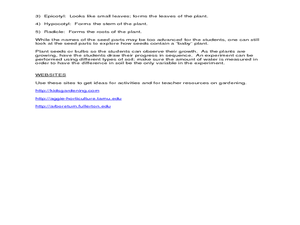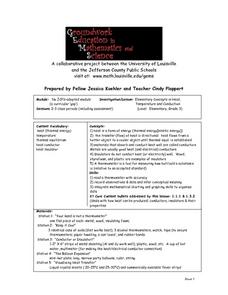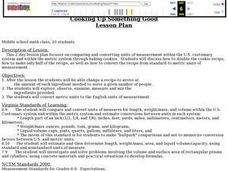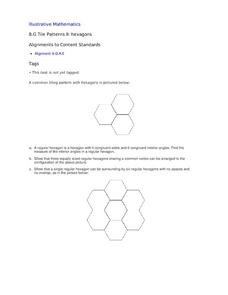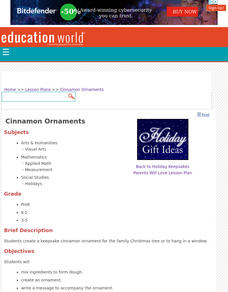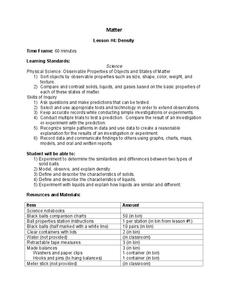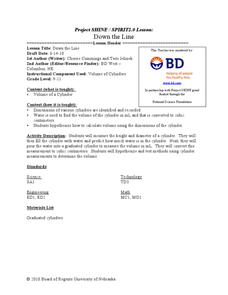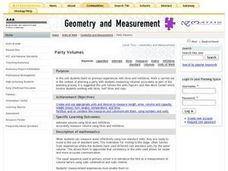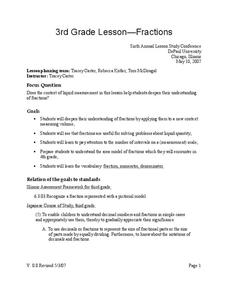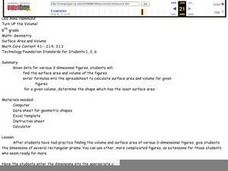Curated OER
Newton's Law of Cooling
Your Algebra learners analyze and solve an exponential equation in this popular, real-life model of the cooling of a liquid.
Discovery Science Center
Kindergarten Observing, Comparing and Contrasting
Although this is a science lesson, it can be adapted to help meet Common Core standards in math as well. Starting scientists describe physical properties of objects and explore three forms of water. To address the Common Core, they can...
Curated OER
Fractions and Measuring in Cooking
Sixth graders explore cooking by creating food in class. In this ingredient measurement lesson, 6th graders discuss some of their favorite foods and review the proper recipes to cook them. Students utilize fractions to create a new...
Curated OER
Measuring Weight, Mass, and Capacity
Second graders measure weight, mass, and capacity. In this measurement lesson, 2nd graders model how to measure amounts of liquid by using containers that measure one cup, one pint, and one quart. Students compare the mass of each...
Curated OER
Elementary Concepts in Heat
Third graders read a thermometer with accuracy, record observations and data, and infer conceptual meaning. They integrate mathematical charting and graphing skills to organize their data. They explore what happens when they touch or use...
Curated OER
Cooking Up Something Good
Students compare and convert units of measurement within the United States customary system and within the metric system by baking cookies. Students discuss how to double the cookie recipe, how to make only half of the recipe, and how to...
Curated OER
Measure-mania
Students research the history of measurement in this instructional activity. They compare todays units of measurement to historical units of measurement. For example, they weigh themselves on a bathroom scale and figure out how many of...
Alabama Learning Exchange
Sky High
How are skyscrapers built? What does it take to make a structurally sound building? How can one work within a budget to complete a building project? These guiding questions will be investigated and answered within a hands-on...
Curated OER
Chemistry Day With Glitter Wands
First graders observe examples of the three states of matter and identify matter in each of the three states. They make glitter wands to remind them of the three states of matter: solid, liquid and gas. Pupils brainstorm and record...
Curated OER
Cold, Clouds, and Snowflakes
Students explore satellite data and graphing. In this weather data analysis math and science lesson, students analyze NASA satellite data to draw conclusions about geographical areas where precipitation might have happened. Students...
Curated OER
Displacement and Density
High schoolers explore displacement. In this displacement and density lesson, pupils find the volume of irregular shaped objects. Afterward, they determine the volume of containers. They compute the amount of water displacement.
Curated OER
Tile Patterns II: Hexagons
After learning that the sum of interior angles for triangles is 108 degrees, take it further to show that the sum of angles in any polygon is the same! Using hexagons, pupils practice finding the measure of the six congruent angles. Make...
Curated OER
Cinnamon Ornaments
Students create keepsake cinnamon ornaments to hang on the family Christmas tree or in a window. They mix ingredients to form dough, create an ornament and write a message to accompany the ornament.
Curated OER
Density
Learners predict when an object will float or sink based on comparison of density of the object to the density of the substance in which it is placed. The access a website and sketch the object in the first column of their table and then...
Curated OER
Filling Up-Gasoline
In this fuel sources worksheet, students calculate the E85 alternative fuel costs per gallon compared to the cost of gasoline. Students complete a table to show the comparison prices. They create a triple line graph to show the...
Berkshire Museum
Where’s the Water?: Acting Out Science Cycles
Young scientists transform themselves into rivers, oceans, clouds, and drops of water in order to explore the water cycle. After assigning and explaining to students their different roles in the activity, the teacher reads aloud a...
Curated OER
Down The Line
Learnersinvestigate three-dimensional shapes. In this geometry lesson, pupils calculate the volume of cylinders using the given dimensions. They create a formula base don observation before using the real formula.
Curated OER
Party Volumes: Measurement
Second graders explore liters and milliliters. They estimate volume and accurately measure the volume. Students plan a party and measure volume using liters and milliliters as part of the planning process.
Curated OER
Measurement
Fifth graders rename measurements with cups, pints, quarts, and gallons. In this measurements lesson plan, 5th graders pour different amounts of liquid that they transfer from cups to pints to quarts and to gallons. The then have to...
Curated OER
What's The Scoop?
Students explore the properties of matter. In this cross curriculum three states of matter science lesson, students listen to the poem "Eighteen Flavors" by Shel Silverstein, and predict what will happen if listed ingredients are...
Curated OER
Jr. Chef Club
Students examine the food pyramid. In this health/math lesson students make biscuits. Students are assigned a group to measure out ingredients. Students also discuss which part of the food pyramid biscuits fall into and the nutritional...
Curated OER
Fractions
Students practice measurement. In this fractions lesson, 6th graders measure volume of a liquid, e.g. 1/5 liter, and learn the vocabulary of fractions (numerator, denominator). Students solve sample problems in small...
Curated OER
Earth's Heavenly Treasures: Hummingbirds
Young ornithologists watch an informative video and use the Internet to gather data about the life, size, habitat, and migration of hummingbirds. The interdisciplinary lesson includes activities that target art, science, math, and...
Curated OER
Turn Up the Volume
Measuring volume can be a mystery for 5th graders, but this hands-on activity gives the gift of discovery. The volume of simple rectangular solids and irregular shapes are calculated through various methods including displacing liquid in...



